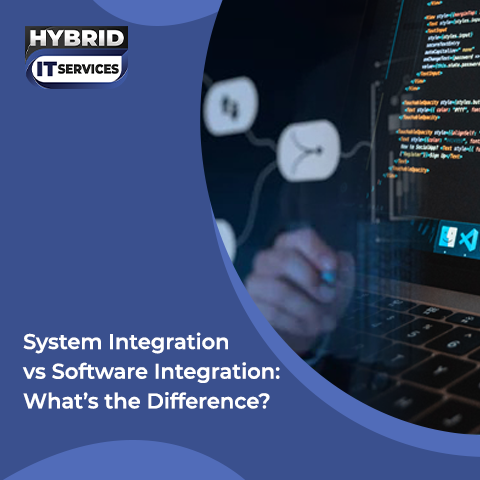The IT industry has experienced a surge in cyberattacks over the past decade. Hackers target websites, applications, hospitals, clinics, and coding data because of the sensitivity. Websites and apps records, financial information, hackers steel not only for ransom but also for resale on the black market.
In response, healthcare and IT organizations are increasingly turning to Artificial Intelligence (AI) to strengthen their defenses. AI offers advanced capabilities in detecting, preventing, and mitigating cyber threats, making it a crucial tool in securing healthcare systems.
With Hybrid IT Services Arizona, you may explore AI fortifies the healthcare sector against cyberattacks, the benefits it brings, its limitations, and the future of AI-driven cybersecurity.
The Rising Threat of Cyberattacks in Healthcare
The healthcare industry is particularly vulnerable to cyberattacks due to its reliance on interconnected systems. Such as electronic health records (EHRs), telemedicine platforms, and Internet of Things (IoT)-enabled medical devices. Some common types of cyber threats in healthcare include:
Ransomware Attacks
Hackers use ransomware to encrypt patient data, rendering it inaccessible until the organization pays a ransom. Such attacks can disrupt critical services, delay treatments, and jeopardize patient safety.
Phishing Scams
Employees receive fraudulent emails designed to trick them into revealing login credentials or sensitive information. Once hackers gain access, they can compromise the entire system.
Insider Threats
These occur when employees, intentionally or unintentionally, cause data breaches by mishandling or leaking information.
IoT Vulnerabilities
Many healthcare devices, such as pacemakers and infusion pumps, are connected to the internet. Hackers can exploit weaknesses in these devices to infiltrate healthcare networks.
Supply Chain Attacks
Cybercriminals target third-party vendors to infiltrate healthcare systems indirectly.
Given these threats, traditional cybersecurity measures such as firewalls and antivirus software are no longer enough to defend against sophisticated attacks.
How AI Strengthens Healthcare Cybersecurity?
AI brings a proactive and dynamic approach to cybersecurity, enabling healthcare organizations to detect and respond to threats in real time. Here’s how AI is revolutionizing cybersecurity in healthcare:
You May Also Read: How to Choose a Cyber Security Solution for Your Business
Advanced Threat Detection
AI can analyze vast amounts of data to identify patterns and anomalies that may indicate a cyberattack. It can track user behavior and flag unusual activities, such as accessing sensitive data at odd hours or from unfamiliar locations. Machine learning algorithms can identify malware based on patterns, even if it’s a previously unknown variant.
Real-Time Incident Response
Traditional cybersecurity methods often detect attacks after significant damage has been done. AI, however, can identify threats in real time and initiate automated responses. It can quarantine affected systems to prevent the spread of malware and block malicious IPs.
Predictive Analytics
AI can predict potential threats by analyzing historical data and identifying vulnerabilities in the system. This allows healthcare organizations to address weaknesses before they are exploited.
Securing IoT Devices
AI can monitor and secure IoT-enabled medical devices by detecting unusual communication patterns or unauthorized access attempts. This ensures that devices like ventilators, imaging machines, and wearable monitors remain safe. In addition, Hybrid IT Arizona also offers IoT software development services to enhance the security and functionality of medical devices, ensuring they remain safe and efficient.
Automating Routine Security Tasks
AI can handle repetitive tasks such as log analysis, software updates, and vulnerability assessments, freeing up IT teams to focus on more complex challenges.
Benefits of AI in Cybersecurity
The adoption of AI in healthcare cybersecurity offers several advantages:
- Improved Efficiency
- Reduced Human Error
- Cost-Effectiveness
Scalability
Challenges in Implementing AI for Cybersecurity
While AI offers promising solutions, there are challenges to its implementation in healthcare cybersecurity:
High Costs
AI systems require significant investment in terms of hardware, software, and skilled personnel. Smaller healthcare organizations may struggle to afford these technologies.
Data Privacy Concerns
AI systems need access to large datasets for training and operation. Ensuring the privacy of patient data during this process is critical.
Complexity of Integration
Integrating AI with existing healthcare IT systems can be complicated and time-consuming.
Evolving Threats
Hackers are also using AI to develop more sophisticated attacks. This creates a constant race between attackers and defenders.
Future of AI in Healthcare Cybersecurity
The future of AI-driven cybersecurity in healthcare looks promising. Innovations on the horizon include:
Federated Learning
This approach allows AI systems to learn from data across multiple organizations without sharing sensitive information, enhancing privacy and security.
AI-Driven Threat Hunting
Advanced AI tools will actively search for vulnerabilities and threats rather than waiting for an attack to occur.
Quantum-Resistant AI
With the advent of quantum computing, traditional encryption methods may become obsolete. AI is expected to play a key role in developing quantum-resistant cybersecurity solutions.
Integration with Blockchain
Combining AI with blockchain technology can enhance data integrity and transparency, making it harder for hackers to tamper with records.
Choose Cybersecurity Software Solution by Hybrid IT
Hybrid IT Arizona offers a cybersecurity software solution to protect your data. Healthcare institutions must embrace AI not just as a tool but as a cornerstone of their cybersecurity strategy, ensuring that they remain resilient against evolving threats. By investing in AI, healthcare providers can fortify their defenses and focus on what matters most: delivering quality care to patients.






